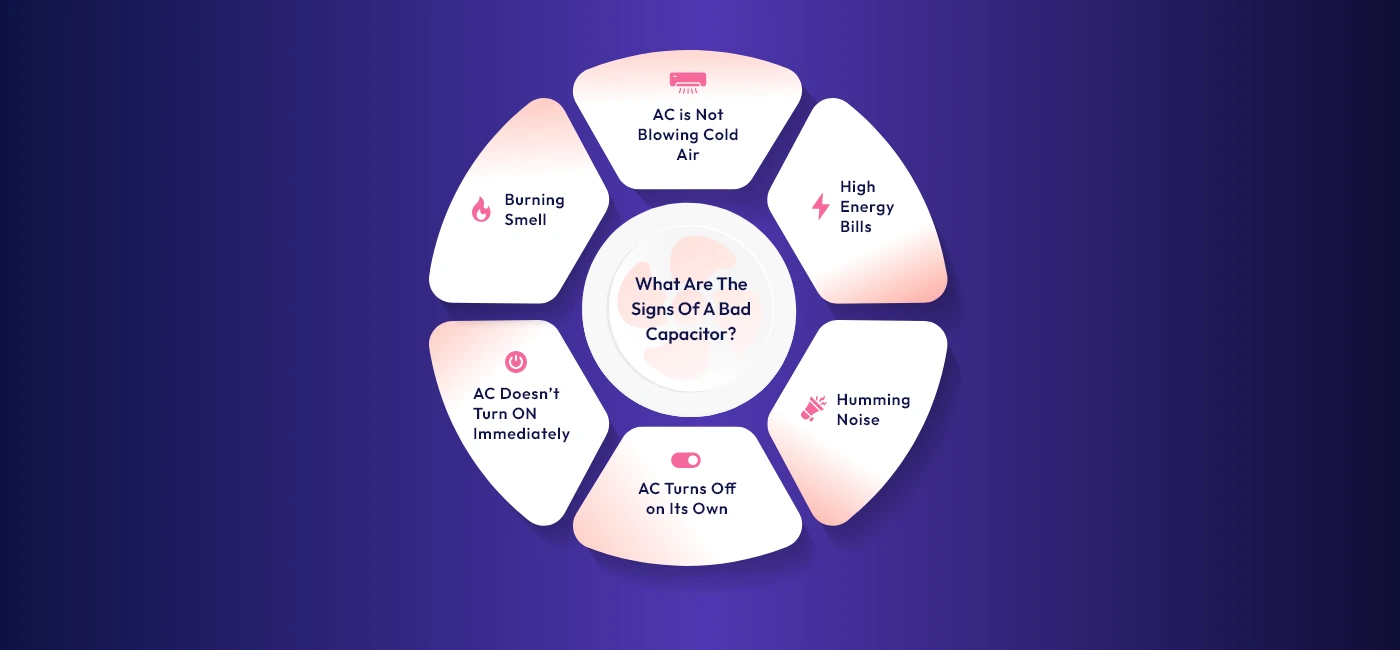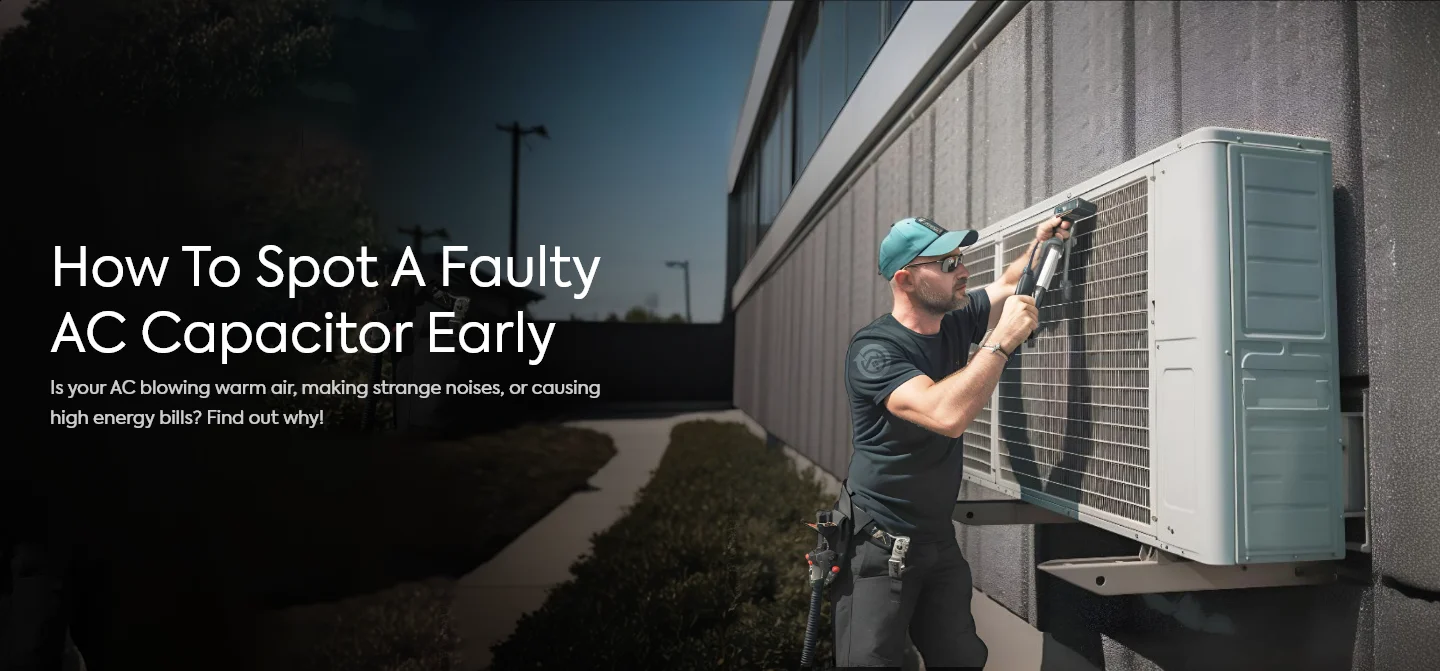Air conditioner issues bothering you?
Like blowing warm air, making strange noises, or making your energy bills higher. Well, it could be because of a part called the AC capacitor that isn’t working right.
AC capacitor is like a battery for your AC. It stores electricity to help start the motor and compressor. When it goes bad, your AC might struggle to start or work properly, leading to problems.
Understanding these signs is important for keeping your home cool. Let’s look at what a bad capacitor means for your AC all in easy-to-understand terms.
Symptoms of a Faulty AC Capacitor
A faulty AC capacitor can mess up with your air conditioner’s performance. Here are some of the common symptoms to watch out for:

Reduced Cooling Performance
AC Is Not Blowing Cold Air
It’s true, that an air conditioner’s job is to keep you nice and cool, and a faulty capacitor can definitely mess with that.
Imagine the capacitor as a little jump starter for your AC. When it’s working properly, it gives the motor a burst of power to get things going. But if the capacitor is on the fritz, the motor might not kick in right, leaving you with warm air instead of cool.
Electrical Issues
High Energy Bills
A good capacitor is like a quick and powerful teammate for your AC. When it’s working normally, it gives the motor a strong push to get started without a struggle.
But a bad capacitor is kind of like a weak teammate. It might take a few tries or extra effort to get the motor going. All that extra work can make your AC use more energy, like running a marathon instead of a jog. And the more energy your AC uses, the higher your electricity bill can climb.
Humming Noise
That humming coming from your AC might be a clue! Remember that capacitor we talked about, the one that jumpstarts your AC’s motor? If it’s not working perfectly, the motor might have a tough time getting going. This struggle can cause a humming noise as the AC tries to work.
Here’s a quick test: turn your AC completely off and then back on. If the humming keeps going, that capacitor could be the culprit.
It’s best to call a professional to take a look and fix the problem before it gets worse. That way, you can keep your cool (and quiet)!
AC Turns Off On Its Own
Those random AC shutdowns are definitely not cool (literally!). You’re onto something with the capacitor. When the capacitor is on the fritz, it can’t maintain a steady flow of energy, which can cause your AC to sputter and shut down unexpectedly.
This can be a real hassle, especially during a heatwave. Replacing the faulty capacitor should solve the problem and get your AC cooling again.
AC Doesn’t Turn ON Immediately
Waiting for your AC to kick on when it’s hot outside is the worst! This slow start-up could be a sign of a tired capacitor. If the capacitor is weak, it might not provide that strong burst of energy. This can make your AC struggle to turn on, taking much longer than usual.
Other Signs
Burning Smell
A burning smell coming from your AC is a big red flag! It happens when the capacitor that supplies power to your AC’s heart (the compressor) breaks down. Due to which the compressor can’t work right, and things can get hot – literally.
In some cases, a failing capacitor might even pop or sputter, and you might see smoke coming out of the AC unit. This is a serious situation! If you notice a burning smell, shut down your AC immediately and call a professional HVAC technician. Don’t try to fix it yourself – it’s best left to the experts to keep you and your home safe.
Old HVAC System
Just like any appliance, your AC’s parts get tired over time. The capacitor is one of those parts that can wear out with age.
This can make your AC struggle to start up, especially if your system is getting older, like over 10 years old.
But even younger ACs aren’t unbeatable! Sometimes unexpected things like power surges or crazy weather can take a toll on the capacitor too. The best way to catch these problems early is to keep an eye on your AC and schedule regular check-ups with a professional.
Need to Replace Your AC Capacitor? Call A Professional!
If you detect any electrical issues, like burning smells or sparks, or if you’re uncertain about inspecting or fixing your AC unit, it’s wise to call an HVAC technician for help. We at Good Guys Home Services have the expertise to handle safety concerns and diagnose any issues, ensuring your AC functions properly.
Don’t wait! Contact us today to get a free estimate and schedule service. Our team is committed to your satisfaction.
The cost to replace an AC capacitor can vary depending on your location and the specific AC model, but it typically ranges from $100 to $300, including parts and labour. It’s best to get a quote from a professional for an accurate estimate.
Yes, extreme temperatures, both hot and cold, can put extra stress on your AC capacitor. Power surges during storms can also damage it, so it’s important to protect your AC during severe weather.
Not always, but a humming noise can indicate that the motor is struggling to start due to a weak capacitor. Other issues, like dirty filters or mechanical problems, can also cause humming, so it’s good to have it checked out.
While it might seem simple, replacing an AC capacitor can be tricky and very dangerous if you’re not familiar with electrical work. It’s usually best to call a professional to ensure it’s done safely and correctly.
Yes, a bad capacitor can cause stress on your AC system. If left unchecked, it might lead to further damage to components like the motor or compressor, resulting in costly repairs.






